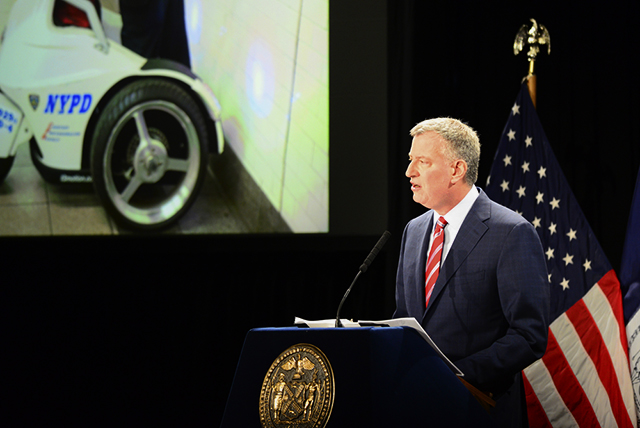
How can we reduce the enormous populations of our country’s local jails?
Last month, Mayor Bill de Blasio of New York unveiled a plan to decrease the population of the Rikers Island jail complex by reducing the backlog of cases in state courts. About 85 percent of those at Rikers haven’t been convicted of any offense; they’re just awaiting trial, sometimes for as long as hundreds of days.
Mayor de Blasio’s plan is a positive step. Yet it ignores a deeper question: Why are so many people – particularly poor people of color – in jail awaiting trial in the first place?
Usually, it is because they cannot afford bail. According to a 2011 report by the city’s Independent Budget Office, 79 percent of pretrial detainees were sent to Rikers because they couldn’t post bail right away.
This is a national problem. Across the United States, most of the people incarcerated in local jails have not been convicted of a crime but are awaiting trial. And most of those are waiting in jail not because of any specific risk they have been deemed to pose, but because they can’t pay their bail.
In other words, we are locking people up for being poor. This is unjust. We should abolish monetary bail outright.
Some will argue that bail is necessary to prevent flight before trial, but there is no good basis for that assumption. For one thing, people considered to pose an unacceptable risk of flight (or violence) are not granted bail in the first place. (Though the procedures for determining who poses a risk themselves ought to be viewed with skepticism, especially since conceptions of risk are often shaped, tacitly or otherwise, by racist assumptions.)
There is also evidence that bail is not necessary to ensure that people show up for trial. In Washington, DC, a city that makes virtually no use of monetary bail, the vast majority of arrestees who are released pretrial do return to court, and rates of additional crime before trial are low.
In addition to being unjust and unnecessary, pretrial incarceration can have harmful consequences. Not only do those who are in jail before trial suffer the trauma of confinement, but in comparison with their bailed-out counterparts, they are also more likely to be convicted at trial. As documented in a 2010 Human Rights Watch report, the legal system is substantially tougher to navigate from behind bars. People in jail face more pressure to accept plea bargains – often, ones that aren’t to their advantage – than do those confronting their charges from home.
Those who spend even a few days in jail can lose their jobs or housing during that time. Single parents can lose custody of their children. By exacerbating the effects of poverty, and by placing people in often traumatizing circumstances, pretrial incarceration may actually lead to more crime.
Bail also raises issues of racial injustice. A number of studies have shown that black defendants are assigned higher bail amounts than their white counterparts. This discrepancy is compounded by the fact that black people disproportionately live in poverty and thus unduly face challenges in paying bail.
Other burdens of bail also fall harder on people of color. For instance, black mothers face a particularly serious risk of losing custody of their children while incarcerated, because they are excessively targeted by child protective services.
Jails disproportionately confine mentally ill people, too – rates of mental illness are four to six times higher in jail than outside – and people with mental health problems often live in economic circumstances that make it difficult to afford bail. A study released in February by the Vera Institute of Justice found that one-third of jailed people with mental illness were unemployed before being arrested.
Finally, monetary bail is at odds with the legal ideal of the presumption of innocence. If we want to grant people this presumption, we must not punish them before their trials.
There is no getting around it: We are incarcerating people for being poor, at great cost to actual human lives. We have to stop.
Trump is silencing political dissent. We appeal for your support.
Progressive nonprofits are the latest target caught in Trump’s crosshairs. With the aim of eliminating political opposition, Trump and his sycophants are working to curb government funding, constrain private foundations, and even cut tax-exempt status from organizations he dislikes.
We’re concerned, because Truthout is not immune to such bad-faith attacks.
We can only resist Trump’s attacks by cultivating a strong base of support. The right-wing mediasphere is funded comfortably by billionaire owners and venture capitalist philanthropists. At Truthout, we have you.
Truthout has launched a fundraiser to raise $38,000 in the next 6 days. Please take a meaningful action in the fight against authoritarianism: make a one-time or monthly donation to Truthout. If you have the means, please dig deep.